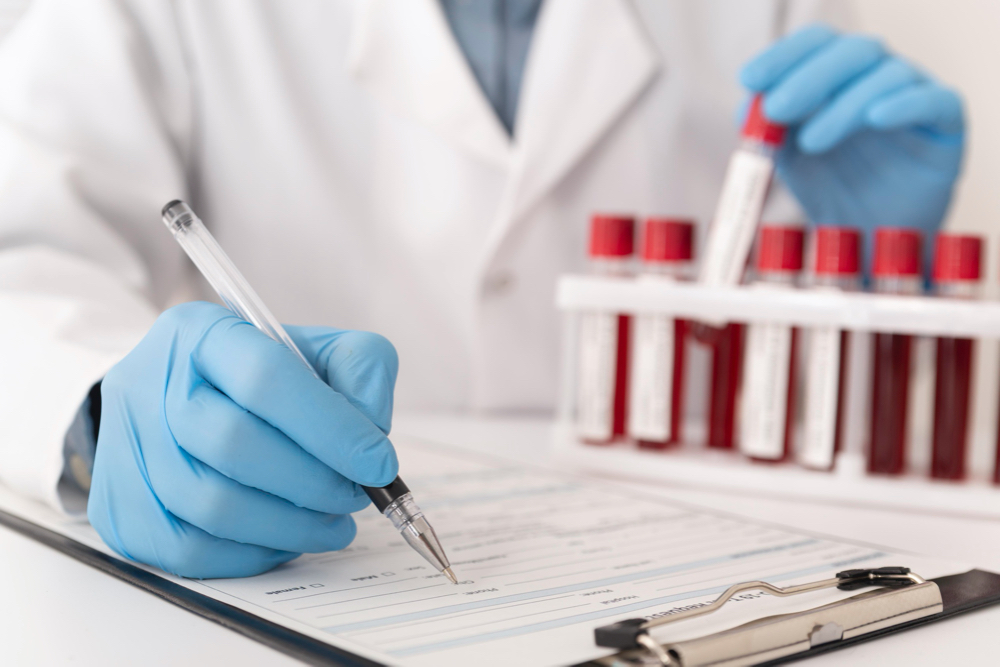- Fast results
- 4,000+ locations
- 4.8 star rating
Need Help? (888) GET LABS


When it comes to assessing your health and diagnosing potential illnesses, blood tests play a crucial role. Two of the most ordered blood tests are the basic metabolic panel 8 and comprehensive metabolic panel 14. While they may sound similar, these tests have key differences and similarities. In this CMP vs. BMP labs article, we will explore how these tests differ and help you understand which is more appropriate for you.
Even though the BMP and CMP tests measure similar substances, they differ in various ways. For one, in a CMP test, additional biomarkers are added to evaluate liver function. These include ALT, AST, alkaline phosphatase, and bilirubin, which provide valuable insights into liver health. As the BMP test doesn’t include these markers, the CMP test is better for evaluating liver function.
The CMP test also measures total protein and enzymes. These protein types can indicate your nutritional status, as well as your liver and kidney health. For this reason, the CMP test is ideal if you’re also checking in on your cholesterol and liver enzyme profile.
The basic metabolic panel (BMP) is a blood test commonly ordered as part of a routine checkup or when symptoms of metabolic disorders are observed. A BMP test can be used to diagnose conditions such as diabetes, kidney disease, liver disease, and electrolyte imbalances. The test is useful for monitoring the efficacy of medications and treatments and for managing chronic conditions.
There are eight substances screened through a BMP blood test. All of which provide clarity about your health, specifically your metabolism and vital organ functions.
You can order the basic metabolic panel 8 (BMP) blood test online. Simply locate a partner laboratory near you to have your blood sample collected and analyzed.
Known as a comprehensive metabolic panel, a CMP 14 blood test provides valuable information about an individual’s overall health and organ function. The test consists of 14 different blood tests that assess different aspects of the body’s metabolism. Healthcare professionals use it to evaluate organ function, monitor conditions, and screen for health problems.
The comprehensive metabolic panel 14 (CMP) blood tests cover all the eight substances screened in the BMP test. But it’s different in that it has six additional tests for liver enzymes.
Your doctor may ask you to order a CMP 14 blood test online instead of the BMP test if there’s a need to assess your liver health and other body functions in which additional tests are necessary. This could be due to symptoms you have, your medical history, or a family history of liver disease.

A CMP blood test differs from a CBC or complete blood count in that a CMP screens for substances indicative of metabolic disorders or problems related to organ dysfunction, while a CBC assesses blood cells to help diagnose and monitor infections, blood disorders, and problems related to immunity. Both lab tests, however, provide an overview of your general health.
Yes, you will be asked to fast for 12 hours before the blood sample collection to ensure that the results are accurate. Make sure not to consume anything except for water during the said timeframe as part of your preparation before the blood test.
People undergoing a routine checkup typically need a BMP blood test. Healthcare providers also request this test to assess your metabolism, especially if you’re being treated in the emergency room. If you show symptoms related to metabolic disorders, you’ll likely need the BMP test as well for proper diagnosis and monitoring when the condition is confirmed.
Individuals who wish to have better control of their help should consider taking the BMP 8 blood test or CMP 14 test for healthcare providers to understand their health status. While the BMP test is the standard test for routine checkups, your doctor may recommend the CMP test based on your previous or current health profile. If you’re still torn between a comprehensive metabolic panel vs. a basic metabolic panel test, consult your doctor to help you decide.


We now offer pharmacy discounts through our PersonalabsRx platform.
We now offer pharmacy discounts through our PersonalabsRx platform.